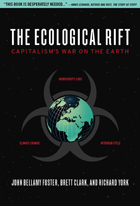capitalism

October 20, 2010 -- Links International Journal of Socialist Renewal, with the permission of Monthly Review Press, is excited to offer its readers an excerpt from the The Ecological Rift: Capitalism’s War on the Earth, an important new book by John Bellamy Foster, Brett Clark and Richard York. Links' readers are urged to purchase the book. Please click here to order your copy. You can download (in PDF) the chapter, "The ecology of consumption", below the following introduction, or read it on screen.
* * *
The new climate-change denialism: Who promotes it, and how to answer it

By Renfrey Clarke
October 15, 2010 – You remember the scandal provoked by the errors and exaggerations in the 2007 report by the United Nations Intergovernmental Panel on Climate Change (IPCC)? And you know all about the even bigger “Climategate” scandal last year, when stolen emails revealed that leading climate scientists were manipulating data to fit their alarmist political agenda? Now we have the next instalment. In a new Guide to the Science of Climate Change the world’s top science body, Britain’s Royal Society, has quit playing politics and stopped peddling its claims of looming disaster.
The limits to energy efficiency under capitalism

By Simon Butler
October 9, 2010 -- Green Left Weekly -- It is close to an article of faith among environmentalists that using less energy is a big part of the solution to climate change. Energy efficiency is often said to be the “low hanging fruit” of climate policy. On face value, the benefits seem obvious.
The knowledge needed to make big gains in efficiency already exists. Using less energy will save consumers and industry money, whereas other policies will be costly. And most importantly, lower energy use could make a big dent in global greenhouse gas emissions.
The UN Intergovernmental Panel on Climate Change and the International Energy Agency both promote energy efficiency as an important climate measure.
However, strong evidence has emerged that new energy efficient technologies alone won’t do much to cut emissions. Indeed, in a capitalist economy, it’s very likely that energy efficiency gains will lead to higher energy use, not less.

By David Masondo, Young Communist League chairperson
September 5, 2010 -- City Press -- There was cautious optimism among many leftists in the African National Congress (ANC) that the ousting of Thabo Mbeki in Polokwane [the ANC's 2007 national conference] might mark a shift towards a much more egalitarian economic policy, including "Black Economic Empowerment (BEE).
Instead, BEE is increasingly becoming too narrow, amounting to ZEE – that is, Zuma Economic Empowerment.
The recent multibillion-rand Arcelor-Mittal BEE deal involving Duduzane, President Jacob Zuma’s son, is another example of how BEE has become too narrow.
To crown it all, the president’s nephew, Khulubuse Zuma, seems to have suddenly become an African imperialist, amassing oil resources in the Democratic Republic of Congo.
Mike Marqusee: Behind cricket's latest scandal -- Pakistan cricket and its discontents

By Mike Marqusee
September 3, 2010 -- MikeMarqusee.com -- On top of floods, war, bombs, a corrupt and incompetent government with a much feared military in the wings, the long-suffering people of Pakistan have now been betrayed, once again, by their cricketers. Most will not be shocked or will profess not to be shocked: over the last 15 years there has been a steady erosion of faith in Pakistan cricket, which has come to be held in the same low esteem as many of the country’s other institutions. It’s one of the reasons cited, along with exorbitant ticket prices, for the low turn-out from the Pakistani diaspora at this summer’s test matches in England.
But while people in and from Pakistan may not be shocked they are bitterly aggrieved. And rightly so. The antics of the three players accused of spot-fixing in the Lord’s test have destroyed the little portion of relief cricket affords for millions coping with trying conditions.
Socialism and the right to daydream

By Billy Wharton
August 31, 2010 -- A recent study featured in the Los Angeles Times suggests that daydreaming or other such unstructured mental activities might play a key role in mental well being. Unknowingly, this study promotes a prime potential of a democratic socialist society – the right to free time. While capitalism, especially in its current neoliberal incarnation, stresses never-ending productivity, a human-centred socialist system would allow for more free time.
Studies have apparently demonstrated that unstructured thought allows the human brain to develop its default mode network. Daydreaming, for instance, is not an escape from brain activity, but a productive working out of society’s complex social rules that allows the brain to function more efficiently in normal mode. Conversely, tasks that require strict attention tend to use one part of the brain at the expense of the default mode.
Ian Angus: What next for ecosocialists?

By Ian Angus
August 30, 2010 -- Canadian Dimension via Climate & Capitalism -- Not long ago, most socialists had little to say about environmental issues, and the environmental movement was focused on individual (change your light bulbs) and capitalist (create a market for emissions) solutions to the ecological crisis.
In 2007, immediately after the founding of the Ecosocialist International Network, I wrote a Canadian Dimension article on the challenges facing ecosocialists. In it, I discussed two parallel trends that, though in their infancy, seemed to portend a new wave of anti-capitalist and pro-ecology action.
Some socialists were moving away from the left’s abstention from the environmental movement, and attempting to develop a distinctly socialist approach to the global environmental crisis.
Michael Lebowitz on the socialist alternative and real human development
Prof. Michael Lebowitz on the socialist alternative from Dangerous Minds at Vimeo.
August 30, 2010 -- Michael Lebowitz is a Canadian Marxist economist. He is the director of the “Transformative practice and human development” program at the Venezuela-based left-wing think tank, the Centro Internacional Miranda. He is professor emeritus of economics at Simon Fraser University and author of Build it Now: 21st Century Socialism and the 2004 Isaac Deutscher-prize winning Beyond Capital: Marx's Political Economy of the Working Class. His latest book is The Socialist Alternative: Real Human Development.
Sport and capitalism -- Would Gramsci go to the footy?

No Pain, No Gain? Sport and Australian Culture
By Dr Jim McKay
Prentice Hall, 1991. 189 pages.
Review by Phil Shannon
Sport tells lies. According to Jim McKay, sport is a social prop to the domination of capitalist ideas and values. Fundamental to the maintenance of this dominance are the mass media, which ``selectively articulate capitalist rationality, masculine hegemony, Eurocentric racism, militaristic nationalism and liberal values'' -- a toxic mix of ideological viruses.
iPhone 4: Capitalism, inbuilt obsolescence and `blood' phones

By Stuart Munckton
August 1, 2010 -- Green Left Weekly -- “Yes, the notable features with iPhone 4 — both the device and the iOS4 — are mostly tweaks”, said a June 22 review on the popular site BoingBoing.net. “But what tweaks they are.”
In the interests of full disclosure, I’ll admit I have no idea what “iOS4” means. But my eye was caught by the admission that the iPhone 4, launched in Australia on July 29, was almost the same as the iPhone 3.
Corporations use “inbuilt obsolescence” as part of artificially creating markets. This means the products they sell are deliberately made to break down — so we have to keep buying more.
In the case of products tied to ongoing innovations, the trick has a variation. Makers will hold back innovations in order to release, a short while later, a new version of the same product with a few extra features.